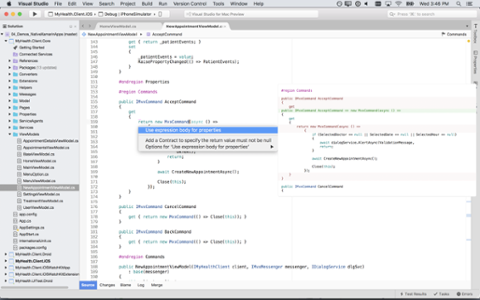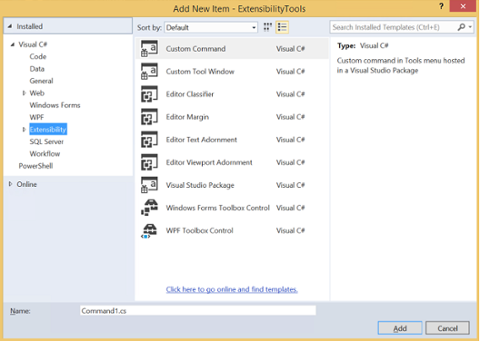[caption id="attachment_138265" align="aligncenter" width="800"]

Visual Studio for Mac[/caption] It’s (almost) official: Visual Studio is coming to the Mac. In a now-deleted blog post, Microsoft noted it will release its homegrown IDE in beta this month. Though Microsoft seems to have hit ‘publish’ on the post a bit early (happens to all of us now and then, right?), a
cached copy has been discovered. The text suggests Microsoft is making some clever moves for developers who want to write iOS and Mac apps using C# code and Microsoft’s own cloud services. The meat of Microsoft’s message is this:
The primary workloads supported by Visual Studio for Mac are native iOS, Android and Mac development via Xamarin, and server development via .NET Core with Azure integration. It’s all powered by the C# language you know and love, with the latest C# 7 productivity enhancements. You get the performance of compiled code, the productivity of a modern type-safe language, access to the unique features of each platform, and a rich ecosystem of libraries and tools. You can use your existing experience across the mobile and cloud domains, sharing code between client and server. And with all your projects in one solution, you can take advantage of solution-wide cross-project refactoring and code navigation.
Visual Studio for Mac’s functional preview also supports F#. Visually, it appears to be
Xamarin Studio rebranded as Visual Studio, so those already using that IDE will be familiar with it. It taps into Microsoft’s native API library, but stops short of letting developers write apps for the Universal Windows Platform (for now, at least).

Like Xamarin Studio, it has an interface builder, the aforementioned F# support, universal search, intelligent refactoring, version control, contextual insights for type, code navigation for finding particular snippets of code and syntax highlighting. If anything, Visual Studio for Mac is a nice middle ground for app developers. It’s not an all-in environment along the lines of Xcode and Android Studio, but still has enough going on that it will turn some heads – especially those who are interested in tapping into Microsoft’s Azure cloud services. Visual Studio for Mac is also a sign of Microsoft’s time. It’s no longer focusing on getting people tied into a platform, and is increasingly trying to out-maneuver Google (and stay ahead of Apple) in the race for services, especially those relying on cloud infrastructure. But it also points to the next big war in which developers will be asked to chose sides: the cloud. Android Studio, Xcode and Visual Studio represent three disparate cloud environments (respectively, Google Cloud Platform, iCloud and Azure). Now that we’re all on common ground, a real push for the hearts and minds of developers can begin. Visual Studio for Mac will launch tomorrow at Microsoft’s
Connect Conference.
 Visual Studio for Mac[/caption] It’s (almost) official: Visual Studio is coming to the Mac. In a now-deleted blog post, Microsoft noted it will release its homegrown IDE in beta this month. Though Microsoft seems to have hit ‘publish’ on the post a bit early (happens to all of us now and then, right?), a cached copy has been discovered. The text suggests Microsoft is making some clever moves for developers who want to write iOS and Mac apps using C# code and Microsoft’s own cloud services. The meat of Microsoft’s message is this:
Visual Studio for Mac[/caption] It’s (almost) official: Visual Studio is coming to the Mac. In a now-deleted blog post, Microsoft noted it will release its homegrown IDE in beta this month. Though Microsoft seems to have hit ‘publish’ on the post a bit early (happens to all of us now and then, right?), a cached copy has been discovered. The text suggests Microsoft is making some clever moves for developers who want to write iOS and Mac apps using C# code and Microsoft’s own cloud services. The meat of Microsoft’s message is this:
 Like Xamarin Studio, it has an interface builder, the aforementioned F# support, universal search, intelligent refactoring, version control, contextual insights for type, code navigation for finding particular snippets of code and syntax highlighting. If anything, Visual Studio for Mac is a nice middle ground for app developers. It’s not an all-in environment along the lines of Xcode and Android Studio, but still has enough going on that it will turn some heads – especially those who are interested in tapping into Microsoft’s Azure cloud services. Visual Studio for Mac is also a sign of Microsoft’s time. It’s no longer focusing on getting people tied into a platform, and is increasingly trying to out-maneuver Google (and stay ahead of Apple) in the race for services, especially those relying on cloud infrastructure. But it also points to the next big war in which developers will be asked to chose sides: the cloud. Android Studio, Xcode and Visual Studio represent three disparate cloud environments (respectively, Google Cloud Platform, iCloud and Azure). Now that we’re all on common ground, a real push for the hearts and minds of developers can begin. Visual Studio for Mac will launch tomorrow at Microsoft’s Connect Conference.
Like Xamarin Studio, it has an interface builder, the aforementioned F# support, universal search, intelligent refactoring, version control, contextual insights for type, code navigation for finding particular snippets of code and syntax highlighting. If anything, Visual Studio for Mac is a nice middle ground for app developers. It’s not an all-in environment along the lines of Xcode and Android Studio, but still has enough going on that it will turn some heads – especially those who are interested in tapping into Microsoft’s Azure cloud services. Visual Studio for Mac is also a sign of Microsoft’s time. It’s no longer focusing on getting people tied into a platform, and is increasingly trying to out-maneuver Google (and stay ahead of Apple) in the race for services, especially those relying on cloud infrastructure. But it also points to the next big war in which developers will be asked to chose sides: the cloud. Android Studio, Xcode and Visual Studio represent three disparate cloud environments (respectively, Google Cloud Platform, iCloud and Azure). Now that we’re all on common ground, a real push for the hearts and minds of developers can begin. Visual Studio for Mac will launch tomorrow at Microsoft’s Connect Conference. 


